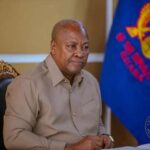Nigeria says it will give all African travellers visas on arrival from January, dropping the requirement that they apply in advance.
President Muhammadu Buhari said it showed Nigeria’s commitment to “free movement of Africans within Africa”.
The announcement comes five months after Nigeria signed a deal aimed at promoting free trade on the continent.
But Mr Buhari’s critics accuse him of being a protectionist, undermining the vision of pan-African unity.
He has kept Nigeria’s land borders with all its neighbours closed since August, making it impossible for businesses to do cross-border trade by road.
Mr Buhari has rejected pressure to lift the blockade, saying it was aimed at ending the smuggling of goods into Nigeria and to make the nation self-sufficient, especially in the production of food.
The borders were shut despite the fact that Nigeria is part of the Economic Community of West African States (Ecowas), a 15-nation regional bloc which allows visa-free travel among its estimated 350 million citizens.
Mr Buhari gave no indication of when the blockade will be lifted when he announced the government’s latest policy on visas for African passport-holders.
Nigeria is seen as an African superpower, with the biggest economy and population.
So what will change?
Currently, applicants for visa to Nigeria often need to make a request in their country of origin, and it will be issued when they arrive in the West African state, BBC Nigeria correspondent Mayeni Jones says.
This would change in the New Year, when citizens of all African states would be able to board a plane to Nigeria and get a visa on arrival, she adds.
What are other African countries doing?
Research released by the African Development Bank (ADB) last month shows that Africans need visas to travel to just under half (49%) of other African countries. They could get visas on arrival in just over a quarter (26%) of states and did not need visas in a quarter (25%) of countries.
This is a slight improvement from 2018, when the figures stood at 51%, 24% and 25% respectively.
Out of Africa’s 54 countries, the five with the best “visa openness” policies were Seychelles, Benin, Senegal, Rwanda and Ghana.
The five worst countries in 2019 were Equatorial Guinea, Libya, Sudan, Eritrea and South Sudan.
Ethiopia was listed as one of the worst performers in 2018, but it has since announced a visa-on-arrival policy for Africans, dropping the requirement that they get one in advance.
Nigeria was ranked at number 30, one down from 2018. It fared better than Africa’s other economic powerhouse, South Africa, which received a score of 36 in 2019, compared with 34 in the previous year.
Kenya – the biggest economy in East Africa – was ranked at number 13, down from the nine ranking it got in 2018.
The African Union (AU) is pushing for a single passport for all African nationals so that they can travel across the continent without requiring visas.
It unveiled an AU passport in 2016, issuing it to heads of state and diplomats. However, no country has as yet given it to ordinary citizens.
Is there pressure to make travel easier?
Yes. Last year, Africa’s richest man, Aliko Dangote, complained that he needed 38 visas to travel within the continent on his Nigerian passport.
Many European nationals, meanwhile, can enter most Africans countries visa-free.
In fact, African nations agreed at a meeting of the AU in 2013 to scrap visa requirements for all African citizens by 2018.
The fact that this has not yet happened signals the extent to which African states are affected by political and economic rivalries – or the fear that their countries would attract many migrants who would take jobs from locals.
South Africa, for instance, plans to create a new Border Management Authority in 2020 in a bid to curb the entry of undocumented migrants – a pledge the governing African National Congress (ANC) made to voters in the general election earlier this year, amid a spate of attacks on nationals of other African countries.
And the Rwanda-Uganda border has been shut since March after Rwanda’s President Paul Kagame accused his Ugandan counterpart Yoweri Museveni of trying to destabilise his government.
Mr Museveni denied the allegation and various diplomatic efforts to reo-open the border have failed, just as efforts to get Nigeria to re-open its border with its neighbours have not succeeded.
This is despite the fact that all the countries are signatories to the African Continental Free Trade Area, an AU plan adopted in 2018 to turn Africa into the world’s largest free trade area.
Source: BBC














